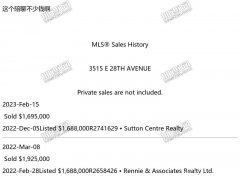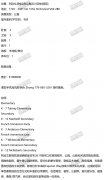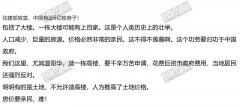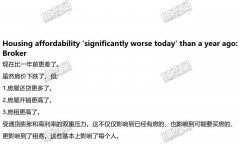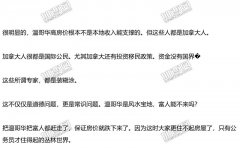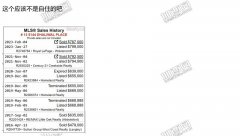在加拿大
中国楼市泡沫几何?

 下载 (38.81 KB)前天 10:08 Among the captivating figures released in China’s 2010 census is a nifty little stat: Chinese urbanites went up from 36 per cent of the population in 2000, to a hair’s-breadth short of 50 per cent in 2010. It’s pretty safe to assume, then, that by the end 0f 2011 there will be more Chinese living in cities than in the countryside. 中国2010年人口普查所产生的各项令人着迷的数据中,有这样一个有意思的数字:中国城市人口占总人口的比例,已从2000年的36%,升至2010年的近50%。因此,人们可以相当有把握地假定,到2011年底,中国城市人口将超过农村人口。 Neat timing, therefore, for a fresh report on whether China is experiencing a property bubble in its major cities. 就此而言,有关中国各大城市是否正在经历一场房产泡沫的一份新报告,发表得很及时。 Commerzbank’s Ashley Davies takes many of the China bubble arguments head on. 德国商业银行(Commerzbank)的阿什利?戴维斯(Ashley Davies)正面回击了有关中国正出现泡沫的种种说法。 “There are too many empty houses” ? no, he says. While estimates vary, a commonly used figure of 64m empty homes equates to 4.8 vacant homes per hundred people. In the US, that figure is 5.9 per 100. “有太多空置房”――他说,实际情况并非如此。尽管各种估计有所不同,但通常采用的数字(6400万套空置住房)相当于每100人4.8套住房。美国的空置率达到每100人5.9套住房。 “Chinese properties are expensive” ? yes, he says, but not too expensive. House price to income ratios in some parts of China are dizzying ? take Beijing, where Commerzbank says it’s 38 times average annual incomes. But in other cities, like Shenyang, the figure is still around 10 ? i.e. somewhere in between Frankfurt (5) and New York (12), but less than Taipei (20) and Singapore (18). If wages rise quickly enough, some of these ratios will fall back to more comfortable levels. “中国房产相当昂贵”――他说,没错,但并不贵得太离谱。房价收入比在中国一部分地区高得令人头晕。以北京为例,德国商业银行表示,北京的房价已达到平均年收入的38倍。但在其它城市,如沈阳,这个数字仍在10倍左右,即在法兰克福(5倍)和纽约(12倍)之间,但低于台北(20倍)和新加坡(18倍)。如果工资上升得足够快,这些比率中有一些将回落至更加令人舒适的水平。 More importantly, prices haven’t hit Japanese levels. In the 1980s, Tokyo office space went for as much as $250,000 a square metre. In Beijing, that figure is currently just $4,100 ? a third that of Singapore. What’s more, people have been discussing a potential property bubble in China for years ? in Japan nobody saw it coming. (Which raises the question ? does a bubble only exist if you can’t see it?). 更重要的是,中国房价尚未达到日本的水平。上世纪80年代,东京的写字楼价格曾经高达每平米25万美元。在北京,这个数字目前仅为4100美元,相当于新加坡水平的三分之一。况且,人们谈论中国可能出现房产泡沫已有多年,而当年在日本没有人预见到房产泡沫。(这引出一个问题:泡沫是否只在你预见不到它的情况下才会存在?) “There’s too much investment in residential construction” ? not necessarily, he says. While housing investment as a percentage of GDP is 8 per cent ? more than it was at the peak in Japan ? there’s no historical evidence of how much is too much. China builds poor quality buildings that will need replacing relatively quickly. Combined with high urbanisation rates, this means a high level of residential investment can be sustained for a long time in China. “住房建设的投资过多“――他说,未必如此。尽管住房投资占国内生产总值(GDP)的8%――超出日本顶峰时期水平――但并无历史证据显示多高的水平才算过高。中国建造的许多楼房质量低劣,需要以较快的速度更换。再加上高速城市化,这意味着高水平的住房投资在中国能够长期持续。
下载 (38.81 KB)前天 10:08 Among the captivating figures released in China’s 2010 census is a nifty little stat: Chinese urbanites went up from 36 per cent of the population in 2000, to a hair’s-breadth short of 50 per cent in 2010. It’s pretty safe to assume, then, that by the end 0f 2011 there will be more Chinese living in cities than in the countryside. 中国2010年人口普查所产生的各项令人着迷的数据中,有这样一个有意思的数字:中国城市人口占总人口的比例,已从2000年的36%,升至2010年的近50%。因此,人们可以相当有把握地假定,到2011年底,中国城市人口将超过农村人口。 Neat timing, therefore, for a fresh report on whether China is experiencing a property bubble in its major cities. 就此而言,有关中国各大城市是否正在经历一场房产泡沫的一份新报告,发表得很及时。 Commerzbank’s Ashley Davies takes many of the China bubble arguments head on. 德国商业银行(Commerzbank)的阿什利?戴维斯(Ashley Davies)正面回击了有关中国正出现泡沫的种种说法。 “There are too many empty houses” ? no, he says. While estimates vary, a commonly used figure of 64m empty homes equates to 4.8 vacant homes per hundred people. In the US, that figure is 5.9 per 100. “有太多空置房”――他说,实际情况并非如此。尽管各种估计有所不同,但通常采用的数字(6400万套空置住房)相当于每100人4.8套住房。美国的空置率达到每100人5.9套住房。 “Chinese properties are expensive” ? yes, he says, but not too expensive. House price to income ratios in some parts of China are dizzying ? take Beijing, where Commerzbank says it’s 38 times average annual incomes. But in other cities, like Shenyang, the figure is still around 10 ? i.e. somewhere in between Frankfurt (5) and New York (12), but less than Taipei (20) and Singapore (18). If wages rise quickly enough, some of these ratios will fall back to more comfortable levels. “中国房产相当昂贵”――他说,没错,但并不贵得太离谱。房价收入比在中国一部分地区高得令人头晕。以北京为例,德国商业银行表示,北京的房价已达到平均年收入的38倍。但在其它城市,如沈阳,这个数字仍在10倍左右,即在法兰克福(5倍)和纽约(12倍)之间,但低于台北(20倍)和新加坡(18倍)。如果工资上升得足够快,这些比率中有一些将回落至更加令人舒适的水平。 More importantly, prices haven’t hit Japanese levels. In the 1980s, Tokyo office space went for as much as $250,000 a square metre. In Beijing, that figure is currently just $4,100 ? a third that of Singapore. What’s more, people have been discussing a potential property bubble in China for years ? in Japan nobody saw it coming. (Which raises the question ? does a bubble only exist if you can’t see it?). 更重要的是,中国房价尚未达到日本的水平。上世纪80年代,东京的写字楼价格曾经高达每平米25万美元。在北京,这个数字目前仅为4100美元,相当于新加坡水平的三分之一。况且,人们谈论中国可能出现房产泡沫已有多年,而当年在日本没有人预见到房产泡沫。(这引出一个问题:泡沫是否只在你预见不到它的情况下才会存在?) “There’s too much investment in residential construction” ? not necessarily, he says. While housing investment as a percentage of GDP is 8 per cent ? more than it was at the peak in Japan ? there’s no historical evidence of how much is too much. China builds poor quality buildings that will need replacing relatively quickly. Combined with high urbanisation rates, this means a high level of residential investment can be sustained for a long time in China. “住房建设的投资过多“――他说,未必如此。尽管住房投资占国内生产总值(GDP)的8%――超出日本顶峰时期水平――但并无历史证据显示多高的水平才算过高。中国建造的许多楼房质量低劣,需要以较快的速度更换。再加上高速城市化,这意味着高水平的住房投资在中国能够长期持续。
 下载 (12.89 KB)前天 10:09 Davies admits that the finances of local governments ? which have sold land in order to generate revenue ? are a concern. They have relied heavily on the housing boom, and a turn in the market would damage their ability to meet payments. 戴维斯承认,对依靠出售土地来产生收入的中国地方政府来说,其财政状况令人担忧。它们严重依赖于楼市繁荣,市场逆转将损害它们的支出能力。 The impending slowdown of the Chinese economy will also put the question of a property bubble - and what it means for the banking system ? in sharper focus. Meanwhile the (mooted) opening of the Chinese capital account could result in huge outflows of capital as wealthy Chinese sell mainland assets to buy up property, stocks etc overseas. 中国经济即将出现的放缓,也将令人更加关注房产泡沫问题、以及该问题对银行体系意味着什么。与此同时,中国(据称正在酝酿的)开放资本账户可能导致资本大量流出,因为有钱的中国人可能卖出国内资产,转而在海外大量买入房地产、股票等。 In conclusion: 结论是: In our view the property market is guilty of exuberance but does not yet constitute a true bubble. Hence, the rationale policy response is to proceed with capital account liberalisation while keeping an iron grip on the property market. This seems to be exactly the approach being attempted by the authorities. 在我们看来,中国房产市场确实有些活跃过度,但并未构成真正意义上的泡沫。因此,理智的政策回应是推进资本账户自由化,同时严格管束房产市场。这似乎也正是中国官方正在尝试的做法。 But one thing that sticks out is this chart, showing residential investment against fixed asset investment over the past 7 years. 但这幅显示过去7年住房投资相对于固定资产投资的图表有一点值得注意。 It makes you wonder ? while there may not be a housing investment bubble in China ? might there be an investment bubble in something else? (Airports, train stations, shopping malls…) 它让你揣测:如果中国不存在住房投资泡沫,会不会在其它领域存在投资泡沫呢?(机场、火车站、购物中心……)译者/和风
下载 (12.89 KB)前天 10:09 Davies admits that the finances of local governments ? which have sold land in order to generate revenue ? are a concern. They have relied heavily on the housing boom, and a turn in the market would damage their ability to meet payments. 戴维斯承认,对依靠出售土地来产生收入的中国地方政府来说,其财政状况令人担忧。它们严重依赖于楼市繁荣,市场逆转将损害它们的支出能力。 The impending slowdown of the Chinese economy will also put the question of a property bubble - and what it means for the banking system ? in sharper focus. Meanwhile the (mooted) opening of the Chinese capital account could result in huge outflows of capital as wealthy Chinese sell mainland assets to buy up property, stocks etc overseas. 中国经济即将出现的放缓,也将令人更加关注房产泡沫问题、以及该问题对银行体系意味着什么。与此同时,中国(据称正在酝酿的)开放资本账户可能导致资本大量流出,因为有钱的中国人可能卖出国内资产,转而在海外大量买入房地产、股票等。 In conclusion: 结论是: In our view the property market is guilty of exuberance but does not yet constitute a true bubble. Hence, the rationale policy response is to proceed with capital account liberalisation while keeping an iron grip on the property market. This seems to be exactly the approach being attempted by the authorities. 在我们看来,中国房产市场确实有些活跃过度,但并未构成真正意义上的泡沫。因此,理智的政策回应是推进资本账户自由化,同时严格管束房产市场。这似乎也正是中国官方正在尝试的做法。 But one thing that sticks out is this chart, showing residential investment against fixed asset investment over the past 7 years. 但这幅显示过去7年住房投资相对于固定资产投资的图表有一点值得注意。 It makes you wonder ? while there may not be a housing investment bubble in China ? might there be an investment bubble in something else? (Airports, train stations, shopping malls…) 它让你揣测:如果中国不存在住房投资泡沫,会不会在其它领域存在投资泡沫呢?(机场、火车站、购物中心……)译者/和风评论
挤泡沫之绿色环保经济适用男免费提供加拿大移民定居资料的下载~免费提供Friends(老友记)剧本和字幕(10集大全)下载~~~免费上传正版《大唐双龙传》迷有福了~回复: 中国楼市泡沫几何?发这些烂东西干啥啊。你不总打听渥太华的事情嘛。
·生活百科 我自动化的空调系统
·生活百科 太阳能分析数据刷新问题
